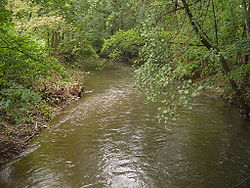You can help expand this article with text translated from the corresponding article in German. (October 2011) Click for important translation instructions.
|
| Dhünn | |
|---|---|
 | |
| Location | |
| Country | Germany |
| State | North Rhine-Westphalia |
| Physical characteristics | |
| Source | |
| • location | Near Wipperfürth |
| Mouth | |
| • location | Near Leverkusen into the Wupper |
| • coordinates | 51°02′59″N 6°57′45″E / 51.0496°N 6.9626°E / 51.0496; 6.9626 |
| Length | 40.0 km (24.9 mi) |
| Basin size | 198 km (76 sq mi) |
| Basin features | |
| Progression | Wupper→ Rhine→ North Sea |
Dhünn is a 40 km (25 mi)-long river located in North Rhine-Westphalia, Germany. Its main source is near Wipperfürth in the Bergisches Land area. It runs in a south-westerly direction, and its mouth into the river Wupper is near Leverkusen, appr. 10 km (6.2 mi) north of Cologne.
Renaturation
By diverting the river bed of the Dhünn around the 'Sensenhammer' weir in April 2010, it was declared the first 'barrier-free river' in North Rhine-Westphalia. This means that the 24 km (15 mi)-long stretch of the river from the mouth into the Wupper to the 'Großen Dhünn' dam is accessible without obstacles for fish and microbes. Fish can now migrate again freely to their spawning grounds.
Sights along the river
- Altenberg Abbey
- Berge castle (German: Burg Berge)
- Strauweiler castle (German: Schloss Strauweiler)
- Morsbroich castle (German: Schloss Morsbroich)
- Freudenthaler Sensenhammer museum (German: Museum Freudenthaler Sensenhammer)
See also
References
- ^ Hydrographic Directory of the NRW State Office for Nature, the Environment and Consumer Protection (Gewässerverzeichnis des Landesamtes für Natur, Umwelt und Verbraucherschutz NRW 2010) (xls; 4.67 MB)
- Press release of the Wupper interest group dated 30 March 2010
- Seite des Museums Schloss Morsbroich
- Seite des Industriemuseums Freudenthaler Sensenhammer
This article related to a river in North Rhine-Westphalia is a stub. You can help Misplaced Pages by expanding it. |